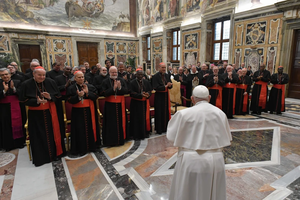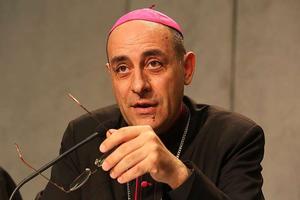The Mission of the DDF Is the Doctrine of the Faith
The appointment of a new prefect to the Dicastery for the Doctrine of the Faith with a ‘different’ mandate is not a repudiation of the importance of safeguarding the integrity of doctrine — not unless Pope Francis was repudiating himself.

The Church’s guardian of orthodoxy, the Dicastery for the Doctrine of the Faith (DDF), received a new prefect on Saturday — Pope Francis’ long-time close collaborator and fellow Argentinian, Archbishop Víctor Manuel Fernández.
This new appointment was also accompanied by the release of a letter from the Holy Father, which he had sent to Archbishop Fernández, setting out some of his expectations for the DDF over the coming years.
“As the new prefect of the Dicastery for the Doctrine of the Faith, I entrust to you a task that I consider very valuable,” the Pope wrote. “Its central purpose is to guard the teaching that flows from the faith in order to “to give reasons for our hope, but not as an enemy who critiques and condemns.”
“The Dicastery over which you will preside in other times came to use immoral methods,” Pope Francis continued. “Those were times when, rather than promoting theological knowledge, possible doctrinal errors were pursued. What I expect from you is certainly something very different.”
But what should have been received as a rather innocuous restatement of the DDF’s mission has been characterized by some as a “regime change,” “ecclesial earthquake” and “total overhaul,” with suggestions that the Pope’s reference to “immoral methods” is intended as a criticism of the DDF’s conduct in investigating dissenting theologians over recent years, including under the papacies of John Paul II and Benedict XVI.
Yet there’s not much evidence that Francis was accusing Benedict XVI, whom he considered to be like a “wise grandfather,” of using immoral methods for sanctioning theologians when he was head of the then-Congregation for Doctrine of Faith (CDF). If this was aimed at Benedict then he’d have to also accuse himself, since it was only last week that the Vatican, undoubtedly with Francis’ own permission, imposed disciplinary sanctions on a dissenting theologian by vetoing the appointment of German theologian Father Martin Lintner as dean of an Italian seminary over his doctrinal errors in relation to sexual morality.
So what “immoral methods” might Pope Francis be referencing in relation to the DDF, which in centuries past and under other names was once responsible for the Roman Inquisition?
His comment translated as “other times” from the letter’s original Spanish, otras épocas, perhaps would be more accurately translated as “other eras” or “other epochs.” And it likely refers to the torture and other violent methods once tolerated in centuries long past by the Inquisition. While the Inquisition was not guilty of many of the crimes popularly imputed to it by the Black Legend, under papal bulls such as Ad Extirpanda it did allow for the use of torture as a tool for interrogation of suspected heretics.
And the Pope’s intentions here are confirmed by Archbishop Fernández himself, who in Spanish-language remarks given to mark his nomination to lead the DDF stated:
The DDF in other times was called the Holy Office, and was dedicated to persecuting heretics, those who made doctrinal errors, and the Pope acknowledges that the office used immoral methods such as torture. He tells me that he is asking me for something very different, because errors are not corrected by persecuting or controlling, but by making faith and wisdom grow. That is the best way to preserve doctrine.
So much for the immoral methods being the polite conversations once had by the then-Cardinal Joseph Ratzinger when he oversaw the CDF.
But what then of the talk from Archbishop Fernández and Pope Francis, focusing more on promoting theological knowledge, rather than punishing doctrinal error? Surely that means the DDF will no longer be acting as a doctrinal watchdog, and that the time of its prefects being known as “God’s Rottweiler” is gone for good?
Well, not so fast. As it turns out, this focus is not a revolution at all, but rather a restatement of the DDF’s mission as it has stood since at least 1965. Pope Paul VI, who reformed the now DDF in his apostolic letter Integrae Servendae, said at that time:
But, because there is no fear in love (1 John 4:18), the defense of the faith is now better served by promoting doctrine, in such a way that, while errors stand corrected and those who err are gently called back to the truth, heralds of the Gospel may find new strength. Moreover, the advance of human culture, whose importance the religious field must not overlook, is that the faithful follow the directives of the Church with greater adhesion and love if, insofar as in matters of faith and morals it is possible to make clear to them the reasons for definitions and laws.
Pope Francis has not dispensed of the DDF’s continued role in disciplining dissent theologians. Only last year, in his February 2022 motu proprio Fidem Servare, the Holy Father reaffirmed that the DDF’s Doctrinal Section is required to “arrange for the examination of … writings and opinions which appear problematic for the correct faith, encouraging dialogue with their authors and proposing suitable remedies.”
And again in his March 2022 apostolic constitution Praedicate Evangelium, which sets out the current structure of the Roman Curia, Francis confirmed the DDF’s role includes “safeguarding the truth of the faith and the integrity of morals.” In fact, the constitution’s doctrinal section lists two tasks for the dicastery:
1. Examines writings and opinions that appear contrary or harmful to right faith and morals; it seeks a dialogue with the authors of these works and presents suitable remedies to be applied, in accordance with its proper norms;
2. Works to ensure that errors and dangerous teachings circulating among the Christian people do not go without suitable rebuttal.
His letter accompanying Fernández’s appointment doesn’t trump the apostolic constitution. So despite some premature celebrations by those who would like to be able to circulate their heterodox ideas without hindrance by Roman discipline or rebuke, under Pope Francis’ watch, we should still expect in the end a doctrinal policeman on the beat. And his methods need not materially differ from his immediate predecessors over recent decades.
- Keywords:
- congregation for the doctrine of the faith
- dicastery for the doctrine of the faith
- pope francis
- archbishop victor manuel fernandez


















